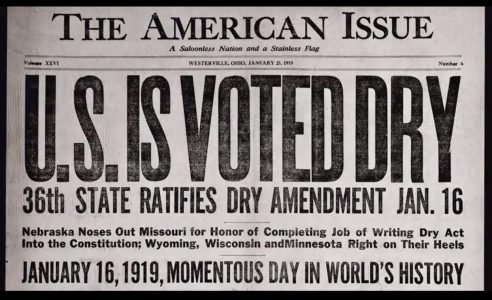100th Anniversary of Prohibition Starting in the United States
Prohibition in the United States was a nationwide constitutional ban on the production, importation, transportation, and sale of alcoholic beverages from 1920 to 1933.
A resolution calling for a Constitutional amendment to accomplish nationwide Prohibition was introduced in Congress and passed by both houses in December 1917. By January 16, 1919, the Amendment had been ratified by 36 of the 48 states, making it law. Eventually, only two states—Connecticut and Rhode Island—opted out of ratifying it. On October 28, 1919, Congress passed enabling legislation, known as the Volstead Act, to enforce the Eighteenth Amendment when it went into effect in 1920.
Origins of Prohibition
In the 1820s and ’30s, a wave of religious revivalism swept the United States, leading to increased calls for temperance, as well as other “perfectionist” movements such as the abolition of slavery. In 1838, the state of Massachusetts passed a temperance law banning the sale of spirits in less than 15-gallon quantities; though the law was repealed two years later, it set a precedent for such legislation. Maine passed the first state prohibition law in 1846, and a number of other states had followed suit by the time the Civil War began in 1861.
Start of national prohibition (January 1920)
Prohibition began on January 17, 1920, when the Volstead Act went into effect. A total of 1,520 Federal Prohibition agents (police) were tasked with enforcement

